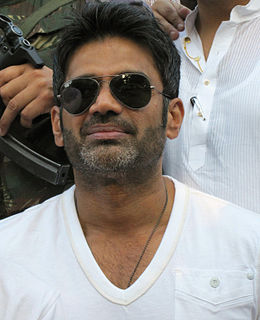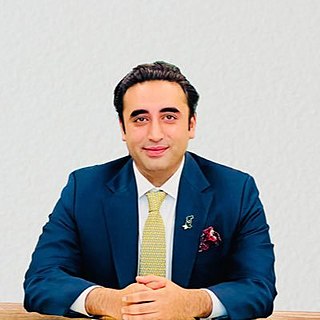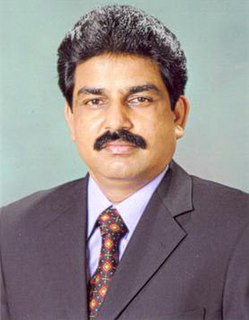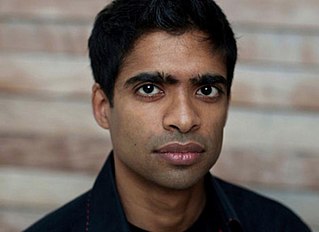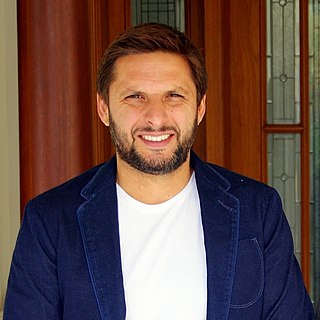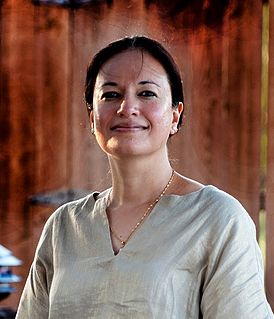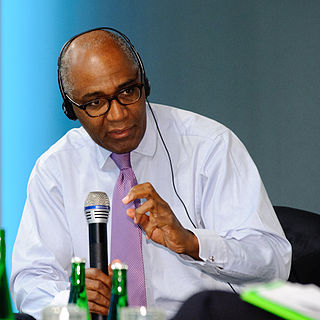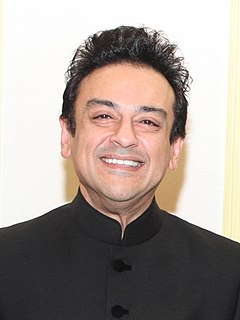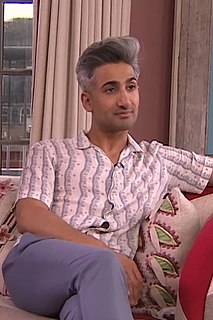Top 162 Pakistani Quotes & Sayings - Page 3
Explore popular Pakistani quotes.
Last updated on December 18, 2024.
I have been only the humblest jugglers-with-facts; and that, in a country where the truth is what it is instructed to be, reality quite literally ceases to exist, so that everything becomes possible except what we are told is the case; and maybe this was the difference between my Indian childhood and Pakistani adolescence--that in the first I was beset by an infinity of alternative realities, while in the second I was adrift, disoriented, amid an equally infinite number of falsenesses, unrealities and lies.
There are two things. There was the moral responsibility, and that, first, is creating an atmosphere where the security forces can kill with impunity, where they can turn up at a place, shoot seven people - really at point-blank fashions - and then get away with it and be, in fact, promoted. And then there is the actual responsibility, the governmental responsibility. My aunt's government forbade us, initially, from filing a police report - which is every Pakistani citizen's right under the law.
In Pakistan, many of the young people read novels because in the novels, not just my novels but the novels of many other Pakistani writers, they encounter ideas, notions, ways of thinking about the world, thinking about their society that are different. And fiction functions in a countercultural way as it does in America and certainly as it did in the, you know, '60s.
When I was growing up, I felt like I had to qualify it and say I'm British-Pakistani. But now I kind of feel like, in this day in age, this is what British looks like. It looks like me; it looks like Idris Elba, and hopefully through Nasir Khan, people will see that that's what an American can look like as well.
When I came home my parents were listening to Pakistani Qawwali music, like Nusrat Fateh Ali Khan, they're listening to music from Mali, like Ali Farka Toure, they're listening to Brazilian songwriters, like Gilberto Gil, to opera, to Neil Young even, things you don't hear as a kid in Caracas. I love all the music they turned me onto.
As the bus slowed down at the crowded bus stop, the Pakistani bus conductor leaned from the platform and called out, "Six only!" The bus stopped. He counted on six passengers, rang the bell, and then, as the bus moved off, called to those left behind: "So sorry, plenty of room in my heart - but the bus is full." He left behind a row of smiling faces. It's not what you do, it's the way that you do it.
I'm inspired by strong, courageous women. My mother is the definition of a self-sufficient, independent woman whom I have always looked up to. I also greatly admire incredible women like Aung San Suu Kyi, and human rights attorney Nasrin Sotoudeh, who was wrongfully imprisoned for 4 years in Iran, simply for giving a voice to the voiceless and defending the helpless. And I'm in awe of the young Pakistani student and activist, Malala Yousafzai, for her bravery and resilience in the face of brutal repression.
President Zardari came to power just as the global recession hit. He had to cobble together an unruly coalition, put up with a constant assault from a conservative supreme court who sought to undermine him at every term. This does not include dealing with Pakistani's omnipotent establishment and the menace of terrorism.
I had the honor of meeting a young Pakistani woman named Malala Yousafzai, who was shot and nearly killed just for trying to go to school. I also heard about how nearly 300 girls in Nigeria were kidnapped from their school dorms in the middle of the night. There are girls like this in every corner of the globe. In fact, there are more than 62 million girls worldwide not attending school, and that's an outrage.
I think in Pakistan there is already democracy and no dictatorship. And recently a few years ago, the Pakistani people stood against the dictatorship of [Pervez] Musharraf and compelled him to resign. So now it is the people's democracy so I don't think any chance that the people should stand against this administration. Pakistan's situation is different than Egypt. They cannot be compared.
Let me name three of the people who influenced me, although it's definitely not a complete list. Ayesha Jalal, the formidable Pakistani-American historian, has rigorously re-evaluated Jinnah's political strategies leading up to Partition. Akbar Ahmed, a former diplomat and now a distinguished scholar, has documented Jinnah's life as a man who welcomed, worked with, and even married people of other faiths. And then there is Ardeshir Cowasjee, the great Parsi newspaper columnist, who in his mid-80s is a kind of living history of all of Pakistan, old enough to have known Jinnah himself.
All one needs to do is just to go to any hospital in America and see the number of Pakistani or Indian or Lebanese, or Syrian, or Egyptian doctors, who are either first generation or themselves immigrants, to know, and I'm a big believer - brains are distributed evenly around the world. What aren't distributed evenly are opportunities, stable government, educational institutions, etc.
My father's from Pakistan and he has been a secularist all his life. In the Pakistani context, there's no messing with religion. There's been a battle for the soul of Pakistan since 1947 and I have grown up without any illusions about the dangers of religious power in the context of a country like Pakistan.
In the summer of 2004, Malem Jan was sitting with Sirajuddin Haqqani, the second son of Jalaluddin, in their Pakistani base in the North Waziristan town of Miram Shah when they heard their names on the BBC. The Americans were offering $250,000 and $200,000, respectively, as rewards for information leading to their capture.
In 2007 and 2008, it was impossible to get American and British policy makers, or Pakistani politicians, to acknowledge that the Taliban leadership was in Pakistan. This is the great virtue of the early statements of the Obama administration, when Obama himself, Richard Holbrooke and others, said that the threat to both countries comes principally from western Pakistan, in Balujistan and Waziristan. So there has been some progress, but probably the hardest part is yet to come.
Both India and Pakistan have a long history of deploying rhetorical strategies to skirt the issue of plebiscite or complete secession of the former princely state of Jammu and Kashmir. When feeling particularly belligerent Pakistan cries itself hoarse declaring the legitimacy of plebiscite held under United Nations auspices in J & K; India responds just as aggressively by demanding the complete withdrawal of Pakistani troops from the territory of pre-partition J & K; or, in a moment of neighborly solicitude, for conversion of the LOC to a permanent International border.
Most liberal-minded folk would like to think that since they are not hostile to people of a different race, racism is a disease of the uneducated, unenlightened and socially backward - football hooligans, British National Party supporters, policemen. You could call this the Bad Guy Theory. But the Bad Guy Theory does not explain why Indian-heritage children do nearly twice as well as Pakistani-heritage children at GCSE.
In countries other than Pakistan - I won't necessarily call them 'Western' - people support me. This is because people there respect others. They don't do this because I am a Pashtun or a Punjabi, a Pakistani, or an Iranian, they do it because of one's words and character. This is why I am being respected and supported there.
Think of the great spirits of the last 50 years: Ghandi killed, not by a Pakistani Muslim, but one of his own Hindus, who hated him because he wanted India for the Muslims, the Sikhs, for everybody; Sadat, killed by the organization that Mr. bin Laden's No. 2 heads now, not by an Israeli, but by an Egyptian. My friend Yitzhak Rabin -- after a lifetime defending Israel, killed -- not by a Palestinian terrorist, but an angry Israeli because he wanted to lay down arms and take up peace... Fanatics are defined by their hatreds; free people by their humanity.
Well, you got to remember, bin Laden killed 3,000 Americans and, in some ways, he and his ideology killed tens of thousands of his fellow Muslims, including Pakistanis. I understand that that was provocative and complicated for Pakistan, but only if you accept the idea that he was an acceptable member of Pakistani society.
In the wake of 9/11, my meetings with Arab and Pakistani Americans, for example, have a more urgent quality, for the stories of detentions and FBI questioning and hard stares from neighbors have shaken their sense of security and belonging. They have been reminded that the history of immigration in this country has a dark underbelly; they need specific reassurances that their citizenship really means something, that America has learned the right lessons from the Japanese internments during World War II, and that I will stand with them should the political winds shift in an ugly direction.
Bradford specifically there were a lot of Pakistanis there. Even today it has a very large Pakistani population.It was something that I experienced - getting chased home from the bus stop after school by English kids, boarding school, being targeted for praying to what they call Allah wallah ding dong.
In a way, both the U.S. media and those wacky rioters in the Afghan-Pakistani hinterlands are very similar, two highly parochial and monumentally self-absorbed tribes living in isolation from the rest of the world and prone to fanatical irrational indestructible beliefs — not least the notion that you can flush a 950-page book down one of Al Gore's eco-crazed federally mandated low-flush toilets, a claim no editorial bigfoot thought to test for himself in Newsweek's executive washroom.
When we carried out air strike across the border after the Pulwama terror attack, we had told the international community that we took that step in self-defence only. We had told the international community that the armed forces were instructed not to harm any Pakistani citizen or its soldier during the strike.
When Indians have loved and embraced Pakistani artistes, why can't the latter come out in their support when injustice has been meted out to the people? No one wants these artistes to wage a war against their government. People didn't demand that they condemn their own country. They just expected them to say something for the sake of humanity.
When generally people make race-based jokes to me - even if they're not technically racist, they're sort of based on me being Pakistani or whatever - on Twitter, you know, I block a lot of people who say something weird about my name or something. It does bug me generally, but it is all about context.
I get good references from a wide range of music. Something who's been a good influence in the last few years is Qawwali music. If you listen to a Qawwali singer like Aziz Mian - he's like James Brown. Qawwali is like Pakistani gospel-jazz. It's emotional, but it's also improvised, and it's all about that sacred-and-profane tightrope.
I was terrified of being on camera. I was worried that whatever I would say, people would assume I'm speaking for every Muslim, every Pakistani, or every Middle Eastern person. That's a lot of pressure. But it also got me excited about what could be done, because I am a representative for people who are underrepresented.
Some Pakistanis fought for the Taliban. Pakistani extremist groups provided infrastructural support to Al Qaeda. There was a coming and going of Al Qaeda militants and leaders between Afghanistan and Pakistan for several years. All that has really happened is that Al Qaeda has escaped from Afghanistan come into Pakistan, got in touch with their contacts and friends in these extremist groups, which then provided them with safe houses, cars, and not just in the border areas but also in the cities. Rooting out Al Qaeda in Pakistan now is where the main battle is being fought.
I'm an actor. Since I was a teenager, I have had to play different characters, negotiating the cultural expectations of a Pakistani family, Brit-Asian rudeboy culture, and a scholarship to private school. The fluidity of my own personal identity on any given day was further compounded by the changing labels assigned to Asians in general.
The New York Times columnist, Thomas Friedman, cited Haqqani to make the argument that Guantánamo must be shut down. He wrote:“Husain Haqqani, a thoughtful Pakistani scholar now teaching at Boston University, remarked to me: 'When people like myself say American values must be emulated and America is a bastion of freedom, we get Guantánamo Bay thrown in our faces. When we talk about the America of Jefferson and Hamilton, people back home say to us: 'That is not the America we are dealing with. We are dealing with the America of imprisonment without trial.'





